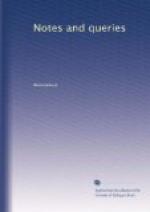The literary history of the Epistolae and the Dialogue is involved in obscurity. That Ulrich von Hutten had a large share in their concoction there can be no doubt; and that he was assisted by Crotus Rubianus and Hermann von Busch, if not by others, seems highly probable. The authorship of Lamentationes Obscurorum Virorum is a paradox which has not yet been solved. They are a parody, but a poor one, of the Epistolae, and in the second edition are attributed to Ortuinus Gratius. If they are by him, he must have been a dull dog indeed; but by some it has been thought that they are the work of a Reuchlinist, to mystify the monks of Cologne, and render them still more ridiculous; yet, as the Pope’s bull against the Epistolae, and Erasmus’s disapproving letter, find a prominent place, and some other well-grounded inculpations occur, it appears to me that some slender-witted advocate of the enemies of learning has here shown his want of skill in handling the weapons of the adversary.
How much Sir Thomas More was pleased with the writings of Hutten we may gather from the opening of a letter which Erasmus addressed to Hutten, giving an interesting account of his illustrious friend, in August, 1519:
“Quod Thomae Mori ingenium sic deamas, ac pene dixerim deperis, nimirum scriptis illius inflammatus, quibus (ut vere scribis) nihil esse potest neque doctius neque festivius; istue mibi crede, clarissime Huttene tibi cum multis commune est, cum Moro mutuum etiam. Nam is vicissim adeo scriptorum tuorum genio delectatur, ut ipse tibi plopemodum invideam.”
The Dialogue (Mire Festivus), which in the edition of 1710 occurs between the first and second parts of the Epistolae, bears especial marks of Hutten’s manner, and is doubtless by him. The interlocutors are three of the illustrious obscure, Magisters Ortuinus, Lupoldus, and Gingolphus, and the first act of the comedy consists in their observations upon the promoters of learning, Reuchlin, Erasmus, and Faber Stapulensis, who afterwards make their appearance, and the discussion becomes general, but no impression can be made upon the stupid and prejudiced monks. The theme is, of course, the inutility of the new learning, Hebrew and Greek and correct Latinity. One short passage seems to me admirable:{122}
“M. Ging. Et Sanctus Ambrosius, Sanctus Augustinus, et alii omnes zelossimi doctores non sciebant ipsi bene tot, sicut iste Ribaldi? M. Ort. Ipsi deberent interponere suis. M. Lup. Non bene indigemus de suo Graeco. M. Ging. Videtur eis, qui sciunt dicere tou, tou, logos, monsotiros, legoim, taff, hagiotatos, quod ipse sciunt plus quam Deus. M. Ort. Magister noster Lupolde, creditis, quod Deus curat multum de iste Graeco? M. Lup. Certe non, Magister noster Ortuine, ego credo, quod Deus non curat multum.”
Ranke, in his History of the Reformation, has very justly estimated the merits and character of these remarkable productions:




